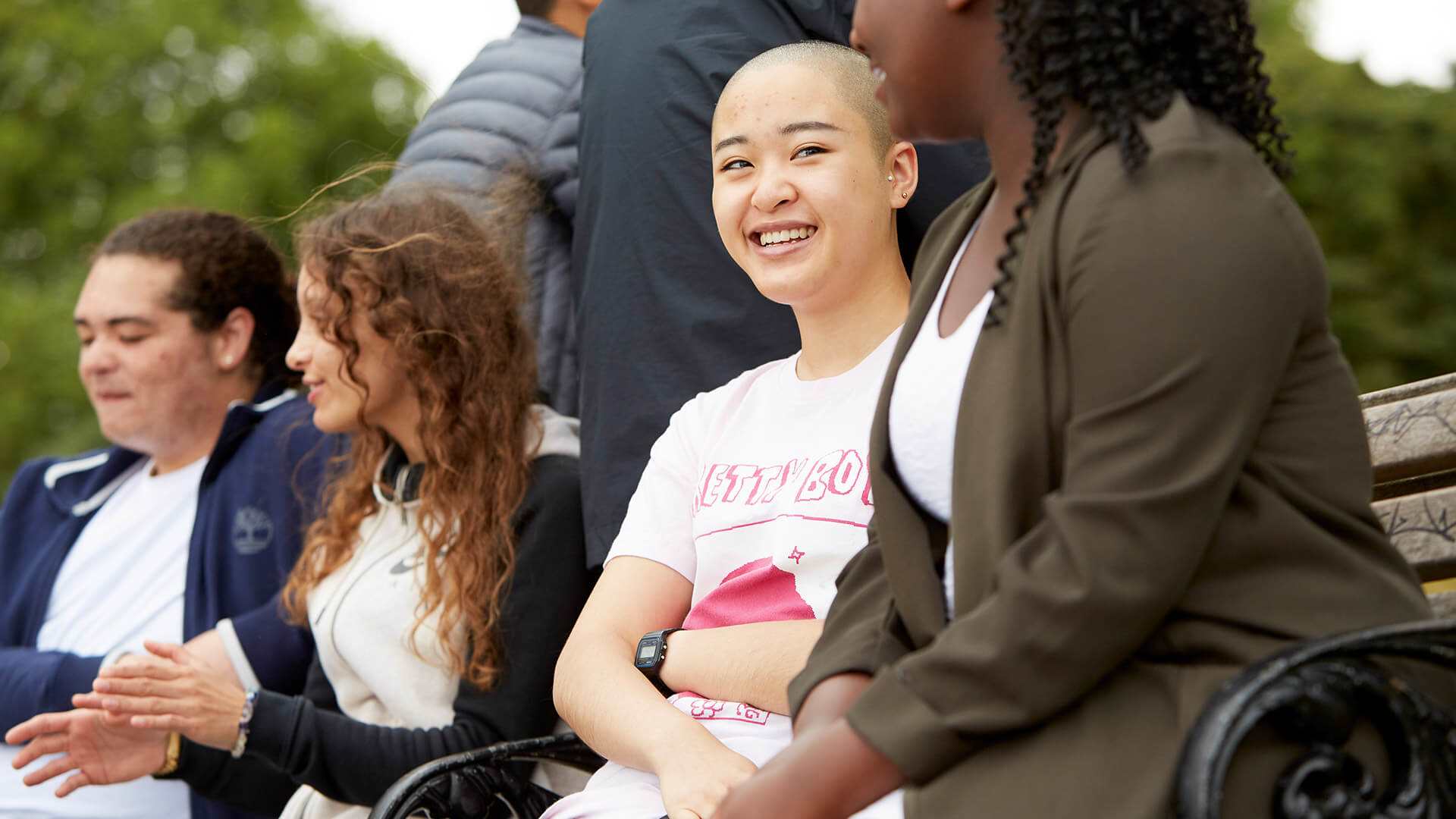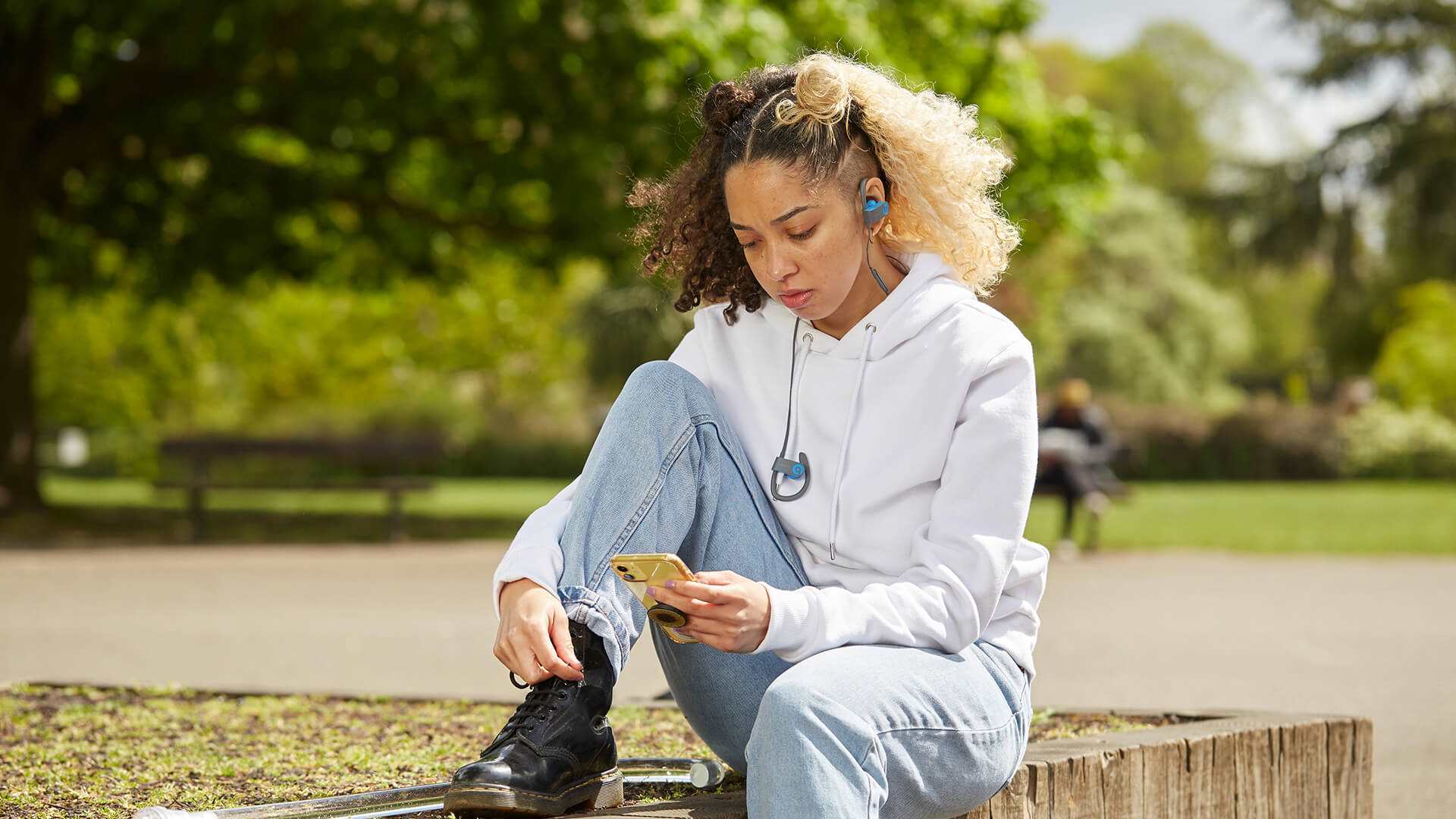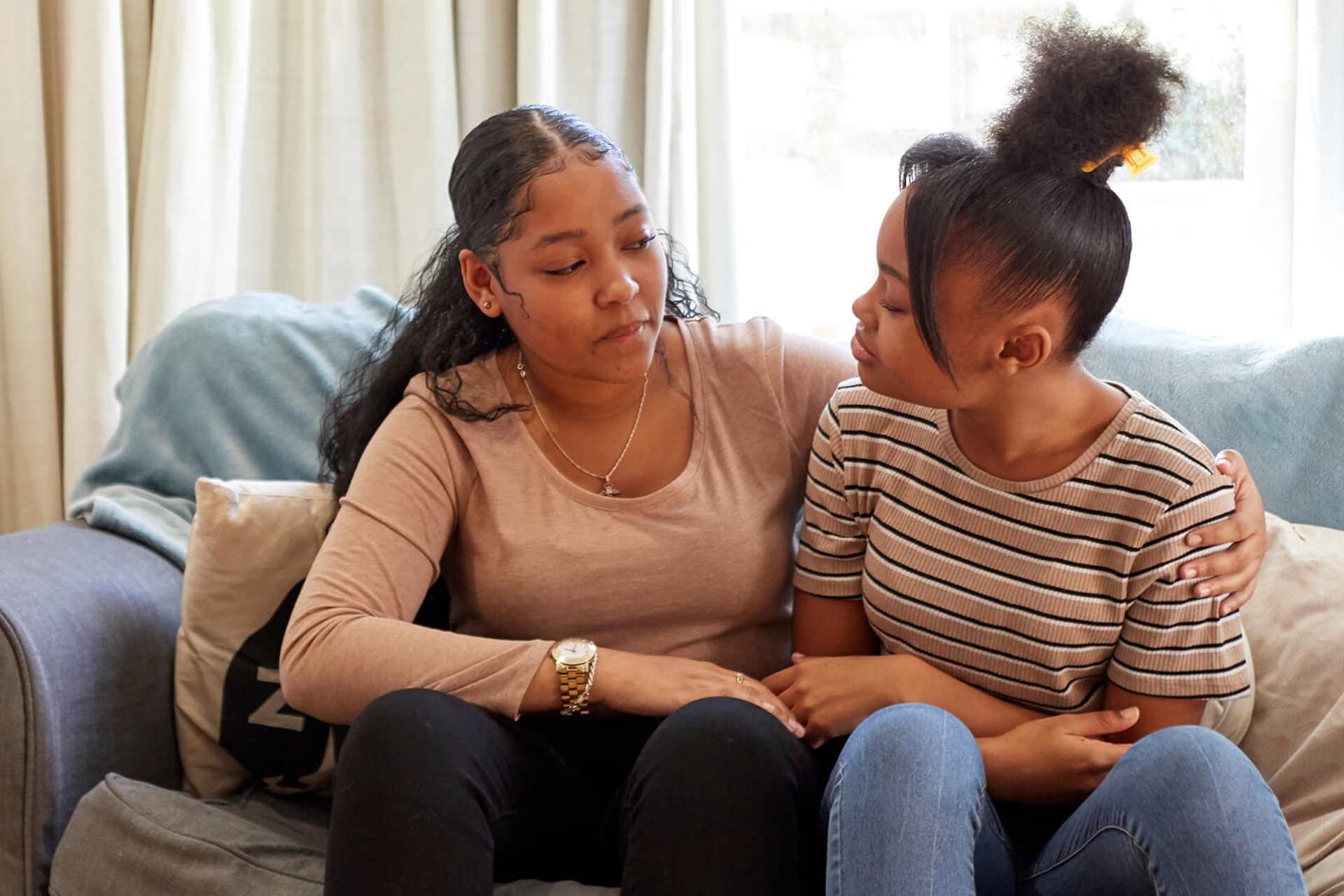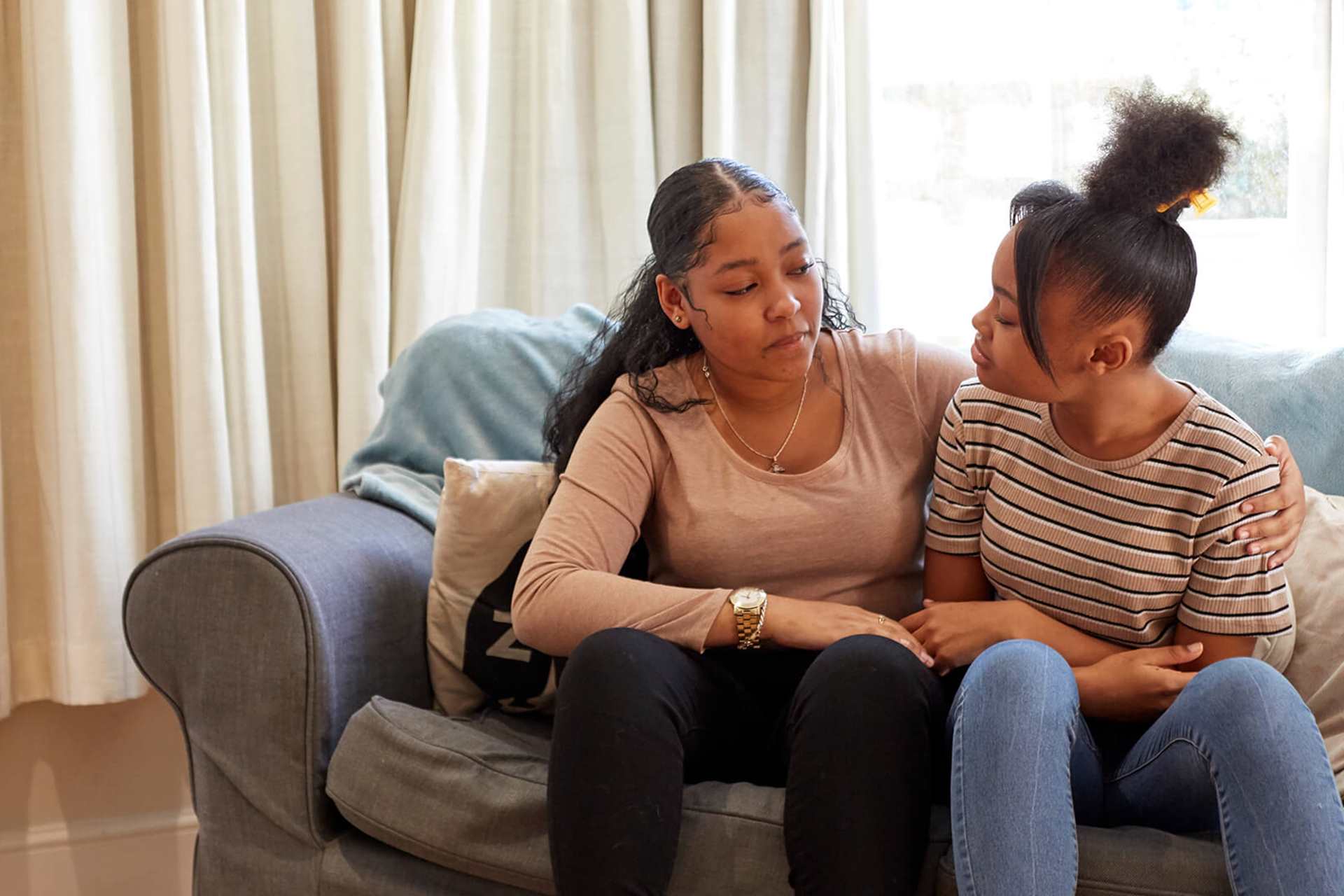What is self-care?
Self-care is about taking time for yourself to help you feel grounded, especially when life feels too much. It gives you a chance to step back and put yourself first, and knowing how to do this is really important for looking after your mental health.
You might think self-care is all about having a relaxing bath, lighting some candles or putting on a face mask. And for some people it is. But in reality, self-care looks different for everyone. What works for one person might not work for someone else.
In its simplest form, self-care is just the little things we do to look after our own mental health. It’s about trying to listen to how we’re feeling and understanding what we need so we can care for ourselves.
This could mean taking a timeout when you're feeling overwhelmed; it could mean making time to do an activity that you know makes you feel good; or it could be as simple as making sure to do the basics like eating and sleeping well when you're struggling.
The important thing with self-care is not what it looks like, but what it does for you and how it makes you feel. When it comes to self-care it’s not one thing, it’s your thing.
What does self-care really mean?
We took to the streets to speak to young people and find out what self-care means to them. Here's what they said.
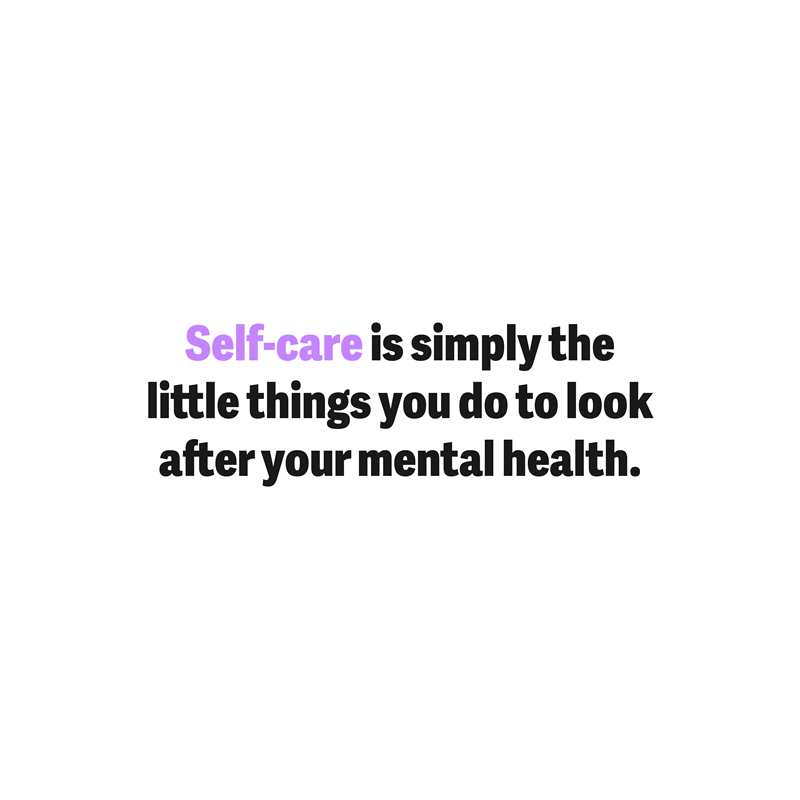
Purple text on a white background. The text says: "Self-care is simply the little things you do to look after your mental health." The word self-care is highlighted in purple.
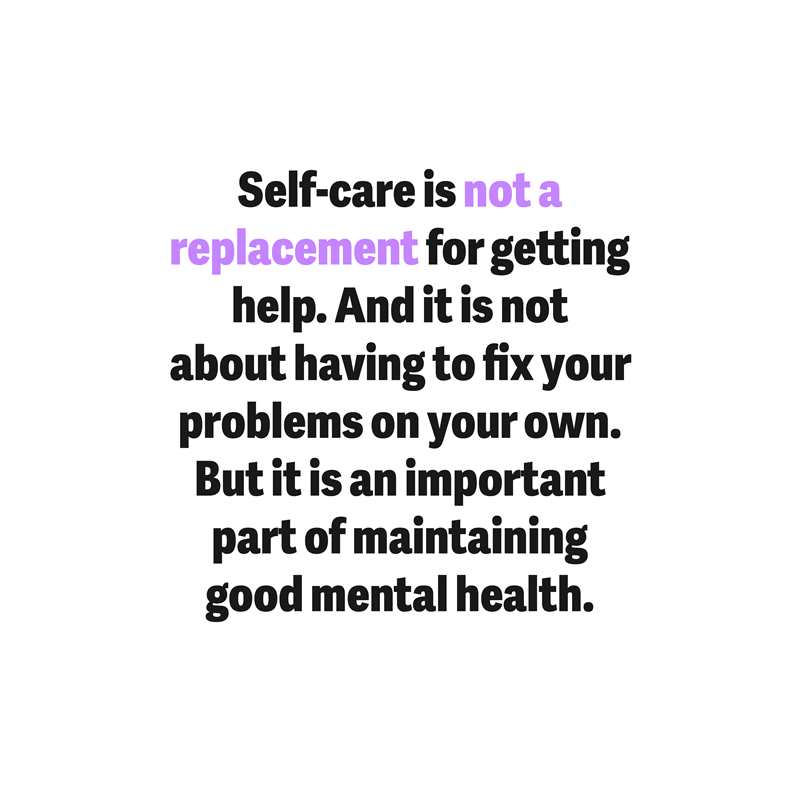
Purple text on a white background. The text says: "Self-care is not a replacement for getting help. And it is not about having to fix your problems on your own. But it is an important part of maintaining good mental health." The words 'not a replacement' are highlighted in purple.
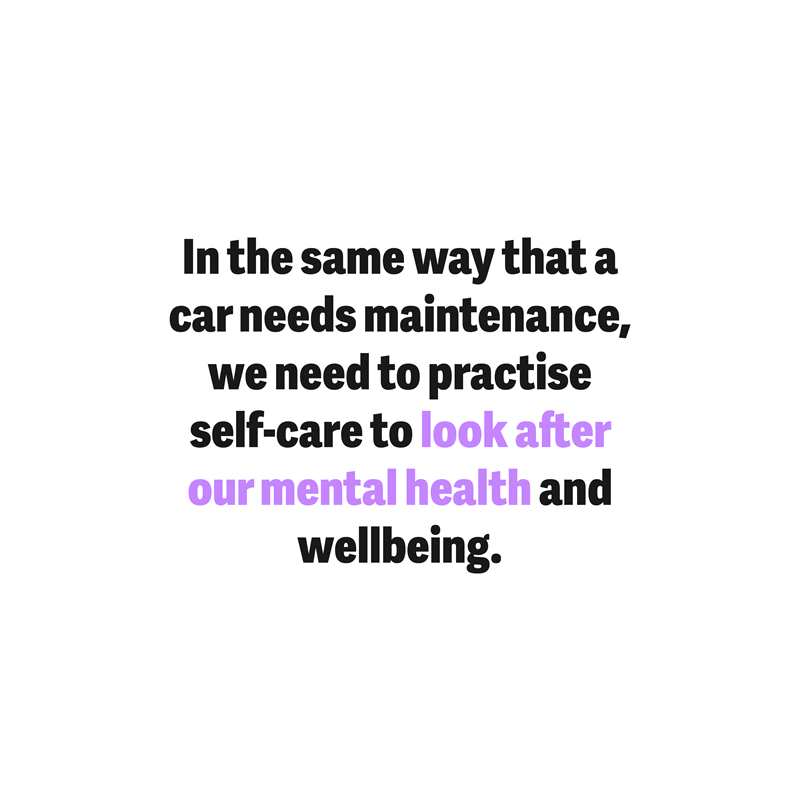
Purple text on a white background. The text says: "In the same way that a car needs maintenance, we need to practise self-care to look after our mental health and wellbeing." The words 'look after our mental health' are highlighted in purple.
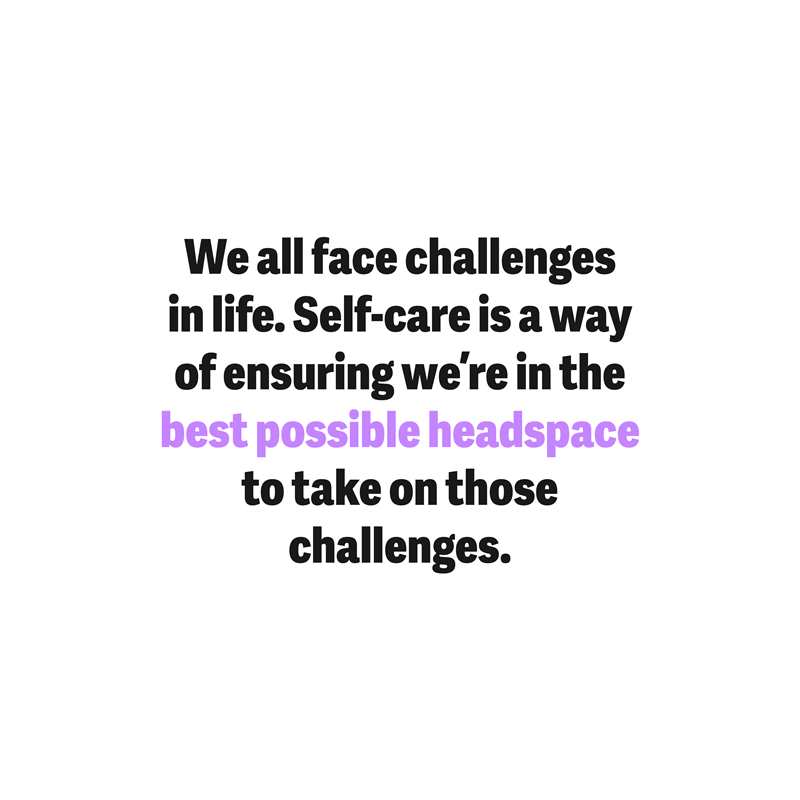
Purple text on a white background. The text says: "We all face challenges in life. Self-care is a way of ensuring we're in the best possible headspace to take on those challenges." The words 'best possible headspace' are highlighted in purple.
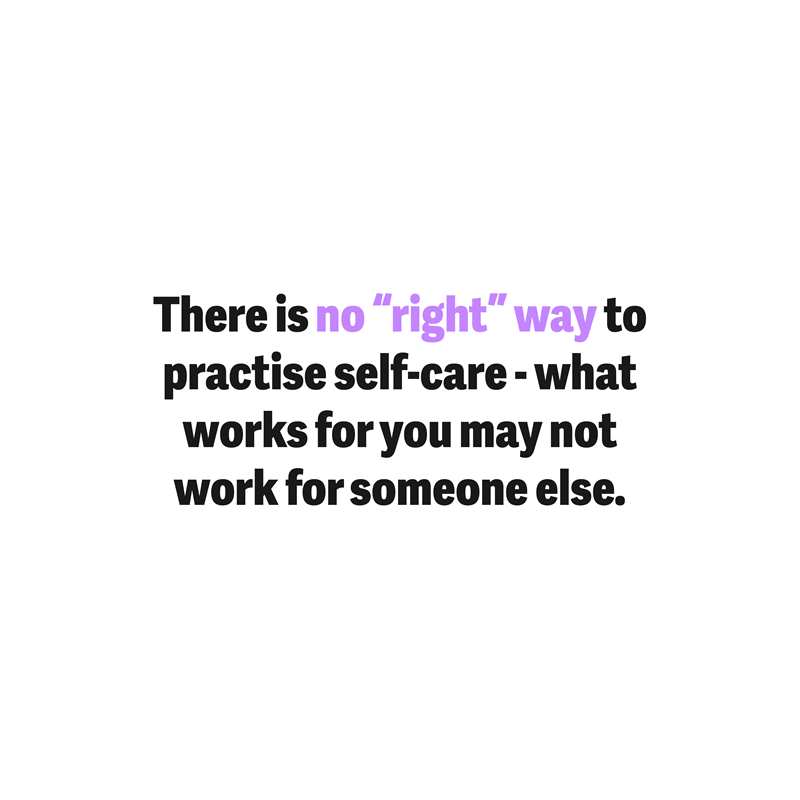
Purple text on a white background. The text says: "There is no "right" way to practise self-care - what works for you may not work for someone else." The words 'no "right" way' is highlighted in purple.
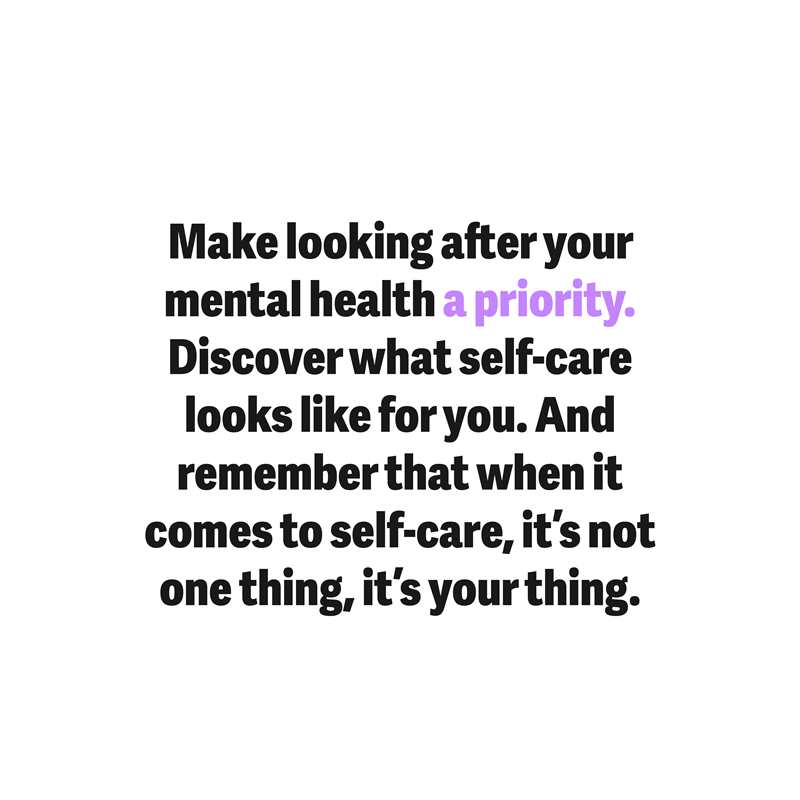
Purple text on a white background. The text says: "Make looking after your mental health a priority. Discover what self-care looks like for you. And remember that when it comes to self-care, it's not one thing, it's your thing." The words 'a priority' are highlighted in purple.
How can self-care help me?
Self-care can be a real game-changer for your mental health and wellbeing. Even if you feel like you don’t have time for it or think it won’t work, it’s important to do the little things that help. Here are some ways that self-care can help:
-
Restore balance
Taking breaks and connecting with yourself can help bring balance back into your life and make you feel more like you again.
-
Boost your mental health
Making self-care a part of your life can help put you in a good headspace, making tough times easier to handle.
-
Lower the pressure
Prioritising you and your needs, even when things are hectic, can stop you from burning out and get more control in your life.
Although self-care is important for your wellbeing, it isn’t a replacement for getting help if you need it. If you’re struggling with your mental health and need support, find out where to get help in our guides.
Time Passes in a Blink of an Eye
By Maryam
Time Passes in a Blink of an Eye is a two-part zine about mental health, healing and faith. In the first half, Maryam shares their experience of feeling lost in long-term struggles with depression. In the second, they reflect on how life slowly began to change.
Finding what self-care works for you
There’s no one way to do self-care. You can keep it simple or go all out with it – it’s really about finding what works for you. It’s okay to try different things until you find what you like. To help you figure this out, think about these questions:
Start by trying things that feel easy to fit into your life, like taking a short walk or writing down your feelings each day.
Think about what makes you feel good and strong. Talking to people you love, doing something creative or connecting with nature might work for you.
Find activities that help you feel centred and present. Mindfulness, journaling and drawing can help you to tune in with yourself.
Take the same care and understanding that you’d give to someone else who’s finding life tough at the moment.
Tune into what you need. If you’re feeling on edge, take time to reset your mind. If you’re feeling jittery, you could try dancing to your favourite song or doing exercise.
Starting self-care can feel weird. Sometimes it can feel like self-care is selfish, especially if you have big responsibilities like caring for a friend or family member. But there’s nothing selfish about looking after yourself – in fact, doing so will make you better able to do the other things you need to do. Remember, you are worthy of self-care and helping yourself feel good can help you to support the people around you too.
Things you can try for self-care
Judging by what we see in adverts or on social media, we might think self-care is all about candles, yoga and luxury bath bombs. And for some people, it is. But for others, these things can be uninteresting, expensive or time-consuming. Don’t worry if you feel like these things aren’t for you – there are always other ways to look after yourself.
Here are some activities that are often suggested for self-care, why they might be good, and some other options to try if they're not for you.
It’s great to do something that feels good for your body, but not everybody likes the bath – or has one!
Instead, try gently stretching, putting on your comfiest pyjamas, or applying some moisturiser or body lotion – whatever works for you.
It’s great to do something that makes you feel calm, but not everyone is able to take yoga classes.
Getting active can be great for our mental health, but there’s more than one way to do it.
Instead, try dancing to your favourite tunes, going for a long walk, or even just shaking your limbs out on the spot. It’s about getting out of your head and into your body.
There’s lots of different ways to unwind and escape from your problems – it doesn’t have to be with a book!
Instead, you could listen to a podcast, watch your favourite TV show or movie, or call up a friend for a chat. Think about the last time you lost yourself in an activity and try that.
Changing our surroundings can be a great way to shake things up, but getting out into nature isn’t always possible.
Instead, try cleaning your bedroom or living space, moving rooms, or even watching a nature show on TV. If you can’t change your physical environment, sometimes a change of mental surroundings can help instead.
It’s important to take care of our physical needs, but that doesn’t have to be anything fancy.
Instead, it could be as simple as getting a glass of water to stay hydrated, getting to bed early, or even just getting up and going to the loo. Listen to what your body needs.
Speaking to someone about your worries is a great way to feel less alone with what you’re going through. But it’s not always easy to open up.
Instead, try writing a journal to get some of your worries out of your head and onto paper. Or sometimes just doing something sociable where you don't talk about anything deep at all, like a kickabout in the park or a coffee with a friend, can be just what you need.
The power of decorating my wheelchair
In this video, Shrishti talks about how decorating her wheelchair supports her self-care and helps her to feel empowered.
Video description: Srishti is a young wheelchair user. She’s sitting on the floor in a room in her home beside her wheelchair, which she’s decorating and personalising with arts and crafts materials. Before the end of the video, Srishti points the camera towards herself to reveal an emotional and proud facial expression, before showing a close up of different parts of her newly-decorated wheelchair.
6-minute watch
Real stories from young people about self-care
When self-care feels too hard or impossible
Sometimes when we’re struggling with our mental health, self-care can feel really difficult or even impossible. Things that used to make you feel good might not make you feel so good anymore. It’s okay to feel that way and it won’t last forever.
In the meantime, try to adjust your expectations of self-care. This means giving yourself time and space without pressuring yourself to do things you don’t feel up to. Instead, focus on the basics: eating, drinking water, resting and looking after your hygiene. These might feel like small things, but they’re all part of self-care, and you should feel proud of yourself for taking the small steps too.
For those of us with a mental health condition or disability, lots of the typical self-care advice might feel particularly challenging, or might not be possible at all. This can be really frustrating and make you feel disconnected from the people around you. But remember, self-care looks different for everyone – the important thing is to find what works for you.
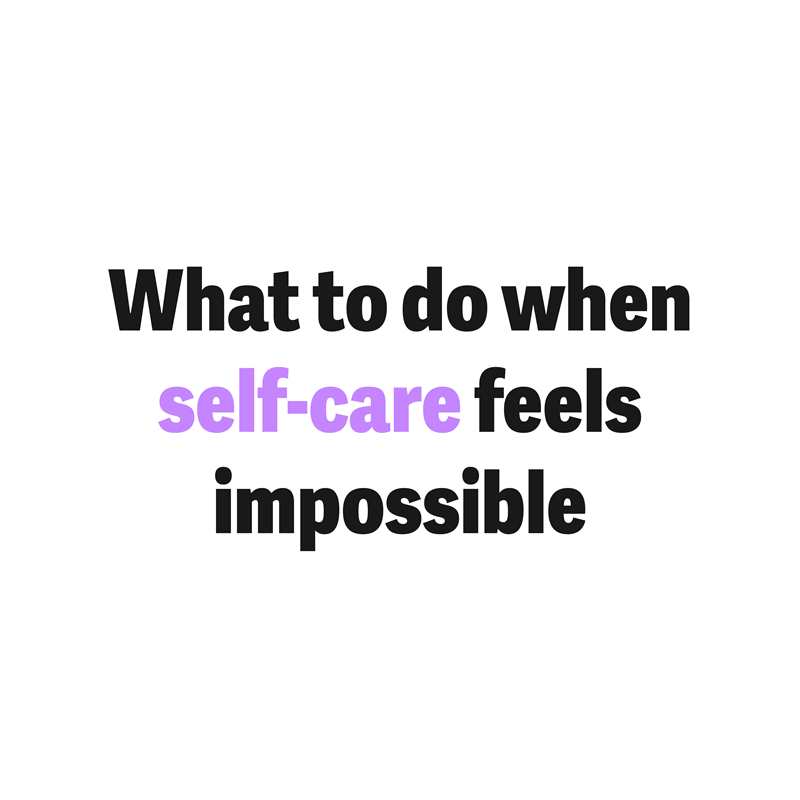
Purple text on a white background in large font. The text says: What to do when self-care feels impossible. The phrase 'self-care' is highlighted purple.
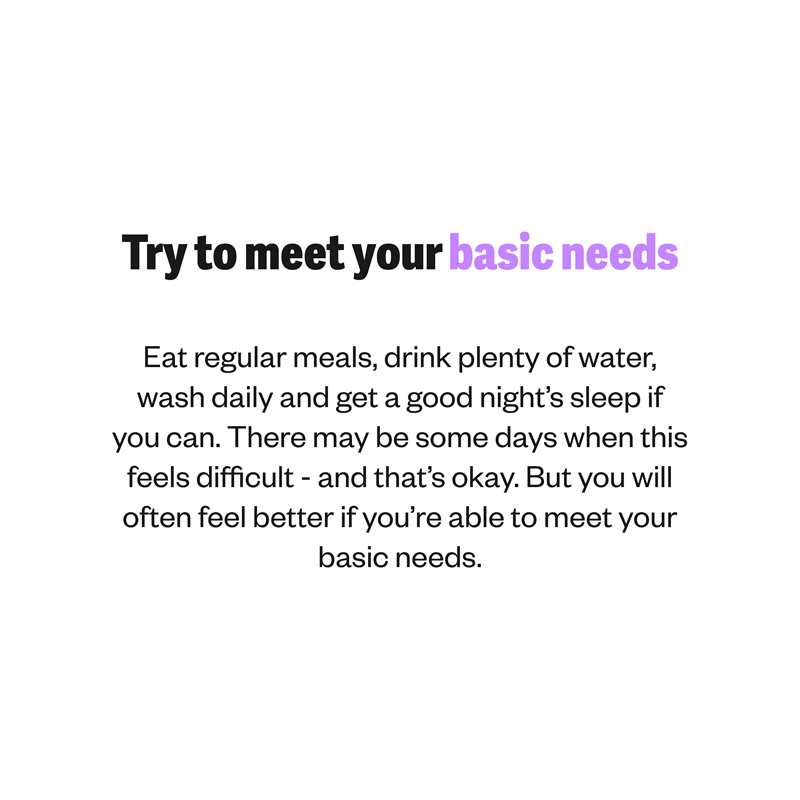
Text on a white background. Highlighted purple is a heading that says: "Try to meet your basic needs." Beneath that is text that says: "Eat regular meals, drink plenty of water, wash daily and get a good night's sleep if you can. There may be some days when this feels difficult - and that's okay. But you will often feel better if you're able to meet your basic needs."
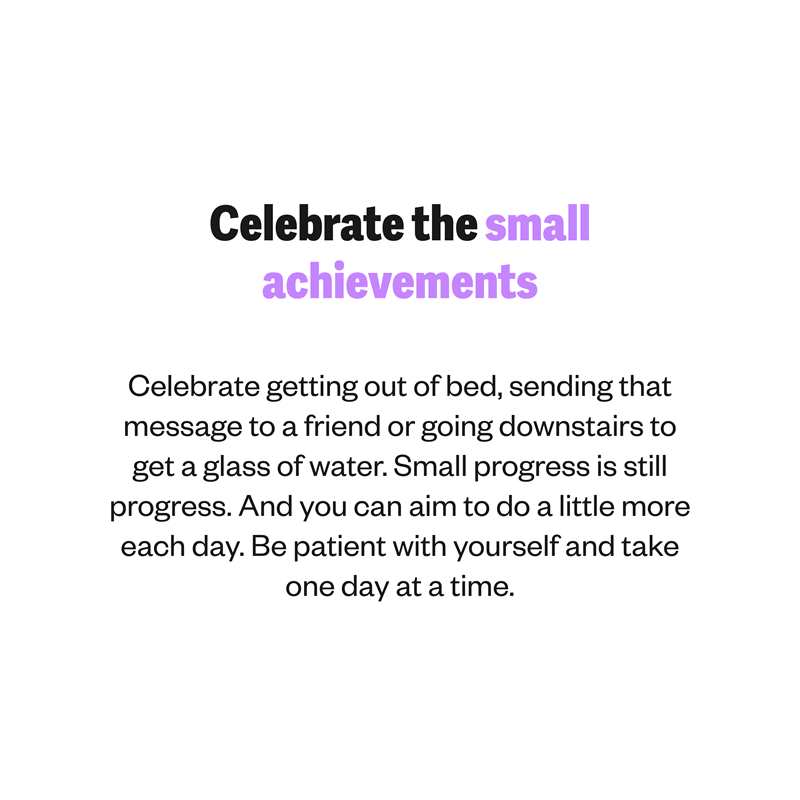
Text on a white background. Highlighted purple is a heading that says: "Celebrate the small achievements." Beneath that is text that says: "Celebrate getting out of bed, sending that message to a friend or going downstairs to get a glass of water. Small progress is still progress. And you can aim to do a little more each day. Be patient with yourself and take one day at a time."
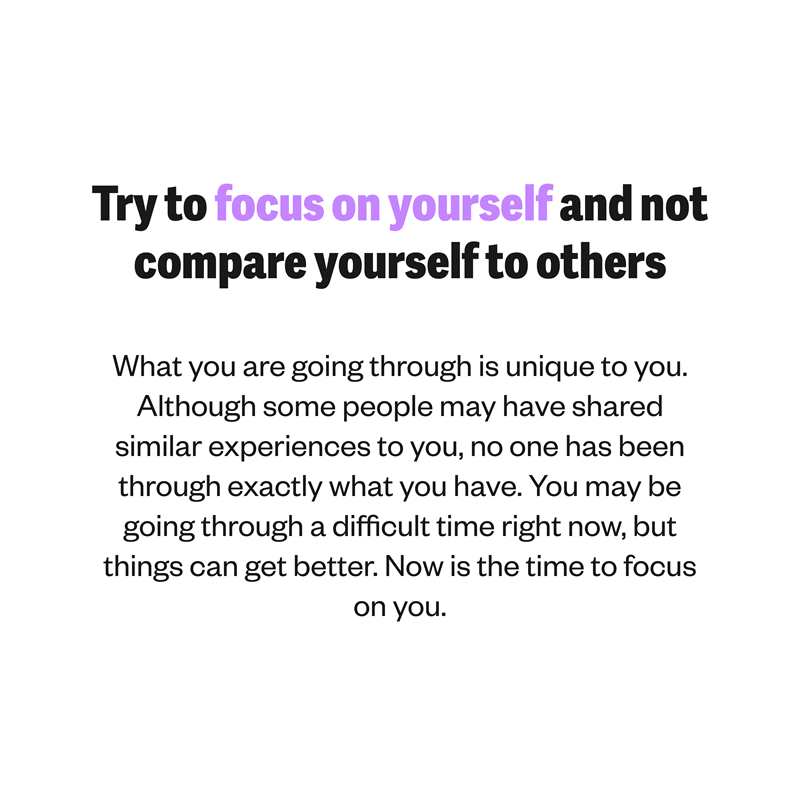
Text on a white background. Highlighted purple is a heading that says: "Try to focus on yourself and not compare yourself to others." Beneath that is text that says: "What you are going through is unique to you. Although some people may have shared similar experiences to you, no one has been through exactly what you have. You may be going through a difficult time right now, but things can get better. Now is the time to focus on you."
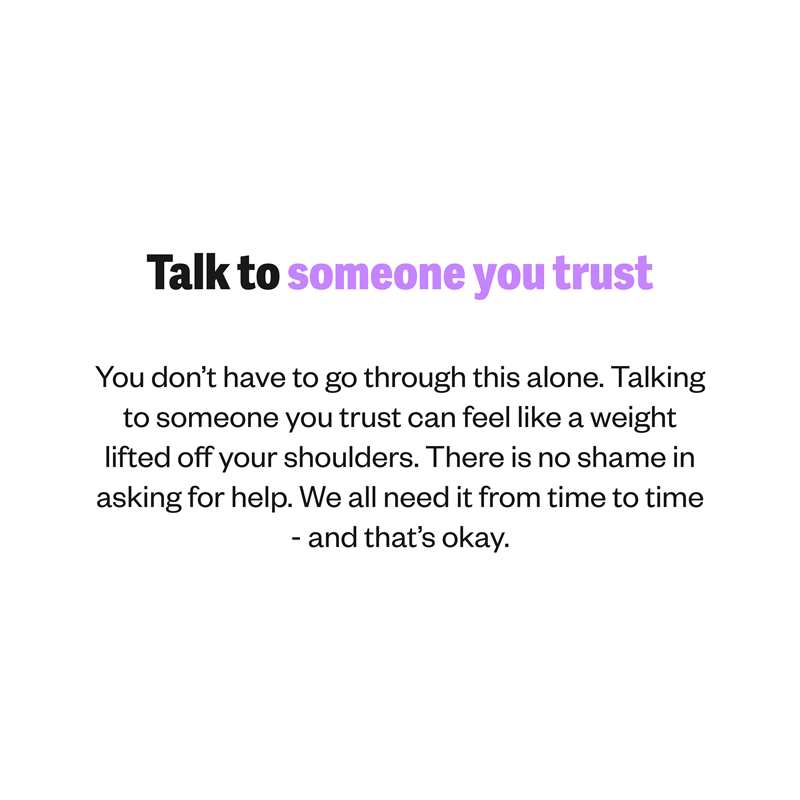
Text on a white background. Highlighted purple is a heading that says: "Talk to someone you trust." Beneath that is text that says: "You don't have to go through this alone. Talking to someone you trust can feel like a weight lifted off your shoulders. There is no shame in asking for help. We all need it from time to time - and that's okay."
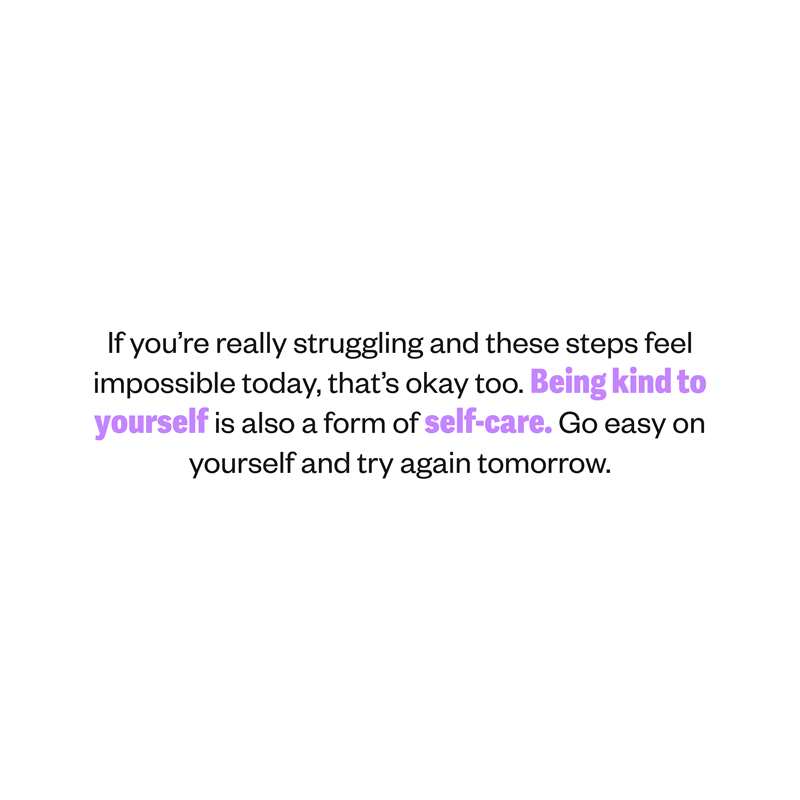
The text says: "If you're really struggling and these steps feel impossible today, that's okay too. Being kind to yourself is also a form of self-care. Go easy on yourself and try again tomorrow." The phrases 'Being kind to yourself' and 'self-care' are highlighted purple.
Community care: looking after those around you

Community care is about people showing up for others and giving support and solidarity during hard times. When you’re going something tough and struggling to look after yourself, it’s okay to lean on the people around you for support. This could be texting a friend who’s been struggling, supporting someone who’s struggling financially, or helping a grieving neighbour. It’s about showing people they’re not alone, no matter what.
Get help now
Self-care is important, but it can’t fix everything. If you’re struggling with your mental health and need support, these organisations and helplines can help.
-
Childline
If you’re under 19 you can confidentially call, chat online or email about any problem big or small.
Sign up for a free Childline locker (real name or email address not needed) to use their free 1-2-1 counsellor chat and email support service.
Can provide a BSL interpreter if you are deaf or hearing-impaired.
Hosts online message boards where you can share your experiences, have fun and get support from other young people in similar situations.
- Opening times:
- 24/7
-
Samaritans
Whatever you're going through, you can contact the Samaritans for support. N.B. This is a listening service and does not offer advice or intervention.
- Opening times:
- 24/7
Whether you love the page or think something is missing, we appreciate your feedback. It all helps us to support more young people with their mental health.
Please be aware that this form isn’t a mental health support service. If you are in crisis right now and want to talk to someone urgently, find out who to contact on our urgent help page.
At YoungMinds we take your privacy seriously. If you’d like to read more about how we keep the information we collect safe, take a look at our privacy policy.

